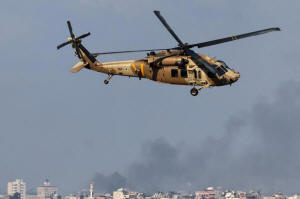Israeli forces battle Hamas in southern Gaza, humanitarian concerns grow
 Send a link to a friend
Send a link to a friend
 [December 06, 2023]
By Bassam Masoud and Ibraheem Abu Mustafa [December 06, 2023]
By Bassam Masoud and Ibraheem Abu Mustafa
GAZA (Reuters) -Israeli troops fought fierce battles with Hamas in
southern Gaza on Wednesday after reaching the heart of the city of Khan
Younis, forcing Palestinian civilians to seek refuge elsewhere as the
number of safe areas decreases.
Israeli warplanes also bombarded targets across the densely populated
coastal territory in one of the heaviest phases of fighting in the two
months since Israel began its military campaign to eliminate the
Palestinian militant group.
Palestinian medics said hospitals were overflowing with dead and
wounded, many of them women and children, and supplies were running out.
Hundreds of thousands of displaced people driven out of the north were
seeking shelter in the dwindling number of places in the south
designated as safe areas by Israel.
In Geneva, the United Nations human rights chief said the situation was
"apocalyptic" and there was a risk that serious rights violations were
being committed by both sides. The U.N. said it was impossible to
deliver aid through the Rafah border crossing from Egypt.
After largely gaining control of northern Gaza, Israeli troops and tanks
pushed further south and encircled Khan Younis following the collapse of
seven-day truce last week.
Israel said its forces had struck hundreds of targets, including a
militant cell near a school in the north. Hamas' armed wing, the al-Qassam
Brigades, said combat was fierce.
Residents said Israeli bombing intensified overnight, killing and
wounding civilians, and that tanks were battling Palestinian militants
north and east of Khan Younis.

Some Palestinians described lucky escapes after their homes were
destroyed in an overnight air strike on the al-Amal neighborhood of Khan
Younis.
"I swear we don't even know how we made it out alive," said Hamdi Tanira,
describing an attack on a house were he said he and about 30 others were
sleeping, including 20 children.
"We were peacefully sleeping, not bothering anyone," said another
survivor, Amal Mehdi. "All of a sudden, the bombardment hit us, you
wouldn’t know where it came from, it was a miracle that we were pulled
from under the rubble."
In Gaza's north, tanks, naval boats and war planes pounded areas of the
Jabalia refugee camp as well as roads and houses, residents and Hamas
media said.
Tanks were stationed on the edge of the Khan Younis refugee camp, not
far from the house of Hamas' leader in Gaza, Yehya Al-Sinwar, they said.
It was unclear whether anyone was there.
The Washington-based Institute for the Study of War said Hamas fighters
were using improvised explosive devices and anti-personnel mines in a
shift of tactics as the fighting moved to close ground combat.
INTERNATIONAL CONCERN
Israel unleashed its military campaign in response to an attack on Oct.
7 by Hamas fighters who rampaged through Israeli towns, killing 1,200
people and seizing 240 hostages, according to Israel's tally.
[to top of second column]
|

An Israeli military helicopter flies as smoke rises over Gaza, amid
the ongoing conflict between Israel and the Palestinian Islamist
group Hamas, as seen from southern Israel, December 6, 2023.
REUTERS/Athit Perawongmetha

Hamas' media office said on Tuesday at least 16,248 people including
7,112 children and 4,885 women had been killed in Gaza since then.
Those figures were not immediately verified by the Gaza health
ministry.
Israel said 84 of its soldiers had been killed since the ground
operation began five weeks ago.
The handful of hospitals that remain open across Gaza are barely
functioning. U.N. human rights chief Volker Turk told reporters his
colleagues had described the situation in the enclave as
apocalyptic.
"In these circumstances, there is a heightened risk of atrocity
crimes," he said.
The United Nations defines "atrocity crimes" as crimes of genocide,
crimes against humanity and war crimes as defined by international
treaties.
Colonel Moshe Tetro, an Israeli humanitarian affairs officer, said
the military has been telling civilians in advance to evacuate from
areas of Khan Younis where it plans to operate, using phone
messages, online statements and leaflets.
The Israeli military said Hamas was using civilians as human shields
and preventing civilians from moving to safe places, an accusation
denied by the militant group.
Gazans say there is no safe place, with remaining towns and shelters
overwhelmed, and Israel bombing areas where it is telling people to
go.
Displaced people sheltering near the border said they feared Israel
would try to force them into Egypt but that they would not go.
"This is the last destination, if they want to deport us by force,
we will not leave. We rather die in our place," said one man who,
with his companions, was sleeping rough. They did not even have
tents.
Israel says some women and children hostages remain in Hamas' hands
and its goal is to find and free them. During the pause in fighting,
Hamas returned more than 100 hostages, but 138 captives remain.
The United States, Israel's closest ally, has urged Israel to do
more to allow fuel and other aid into Gaza and reduce harm to
civilians.
The U.N.'s Turk said the only way to end the conflict was to end the
Israeli occupation of Palestinian territories and opt for a
two-state solution with Israel and an independent Palestine.
(Reporting by Nidal Al Mughrabi in Cairo, Maggie Fick in Beirut, Dan
Williams and Henriette Chacar in Jerusalem, and Reuters bureaux,
Writing by Angus MacSwan; Editing by Timothy Heritage)
[© 2023 Thomson Reuters. All rights
reserved.]This material
may not be published, broadcast, rewritten or redistributed.
Thompson Reuters is solely responsible for this content.
 |